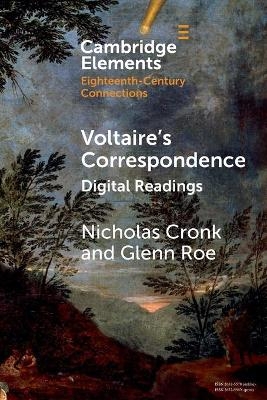
Voltaire's Correspondence
Digital Readings
Seiten
2020
Cambridge University Press (Verlag)
978-1-108-79172-4 (ISBN)
Cambridge University Press (Verlag)
978-1-108-79172-4 (ISBN)
This Element addresses how modern readers can understand the subtle and playful literary performances that constitute Voltaire's correspondence. Digital reading methods and resources enhance our understanding of this complex literary object and its relationship to Voltaire's more canonical literary output, and to the Enlightenment world at large.
Voltaire's correspondence has been described as his 'greatest masterpiece' – but if it is, it is also his least studied. One of the most prodigious correspondences in Western literature, it poses significant interpretative challenges to the critic and reader alike. Considered individually, the letters present a series of complex, subtle, and playful literary performances; taken together, they constitute a formidable, and even forbidding, ensemble. How can modern readers even attempt to understand such an imposing work? This Element addresses this question through the use of digital reading methods and resources that enhance our understanding of this complex literary object and its relationship to Voltaire's more canonical literary output, and indeed to the Enlightenment world at large. Nicholas Cronk and Glenn Roe provide scholars and students with new pathways into this particular corpus, using tools and approaches that can then be applied to correspondences and life-writing texts in all languages and periods.
Voltaire's correspondence has been described as his 'greatest masterpiece' – but if it is, it is also his least studied. One of the most prodigious correspondences in Western literature, it poses significant interpretative challenges to the critic and reader alike. Considered individually, the letters present a series of complex, subtle, and playful literary performances; taken together, they constitute a formidable, and even forbidding, ensemble. How can modern readers even attempt to understand such an imposing work? This Element addresses this question through the use of digital reading methods and resources that enhance our understanding of this complex literary object and its relationship to Voltaire's more canonical literary output, and indeed to the Enlightenment world at large. Nicholas Cronk and Glenn Roe provide scholars and students with new pathways into this particular corpus, using tools and approaches that can then be applied to correspondences and life-writing texts in all languages and periods.
1. Beginnings; 2. Names; 3. Neologisms; 4. Quotations | French; 5. Quotations | Latin; 6. Futures.
| Erscheinungsdatum | 13.11.2020 |
|---|---|
| Reihe/Serie | Elements in Eighteenth-Century Connections |
| Zusatzinfo | Worked examples or Exercises |
| Verlagsort | Cambridge |
| Sprache | englisch |
| Maße | 150 x 227 mm |
| Gewicht | 150 g |
| Themenwelt | Geisteswissenschaften ► Philosophie ► Geschichte der Philosophie |
| Geisteswissenschaften ► Philosophie ► Philosophie der Neuzeit | |
| Geisteswissenschaften ► Sprach- / Literaturwissenschaft ► Anglistik / Amerikanistik | |
| Geisteswissenschaften ► Sprach- / Literaturwissenschaft ► Literaturwissenschaft | |
| ISBN-10 | 1-108-79172-7 / 1108791727 |
| ISBN-13 | 978-1-108-79172-4 / 9781108791724 |
| Zustand | Neuware |
| Haben Sie eine Frage zum Produkt? |
Mehr entdecken
aus dem Bereich
aus dem Bereich
die kolonialen Wurzeln der französischen Theorie
Buch | Hardcover (2024)
Matthes & Seitz Berlin (Verlag)
28,00 €
eine Geschichte der Zuversicht von Homer bis zum Klimawandel
Buch | Hardcover (2024)
C.H.Beck (Verlag)
28,00 €


